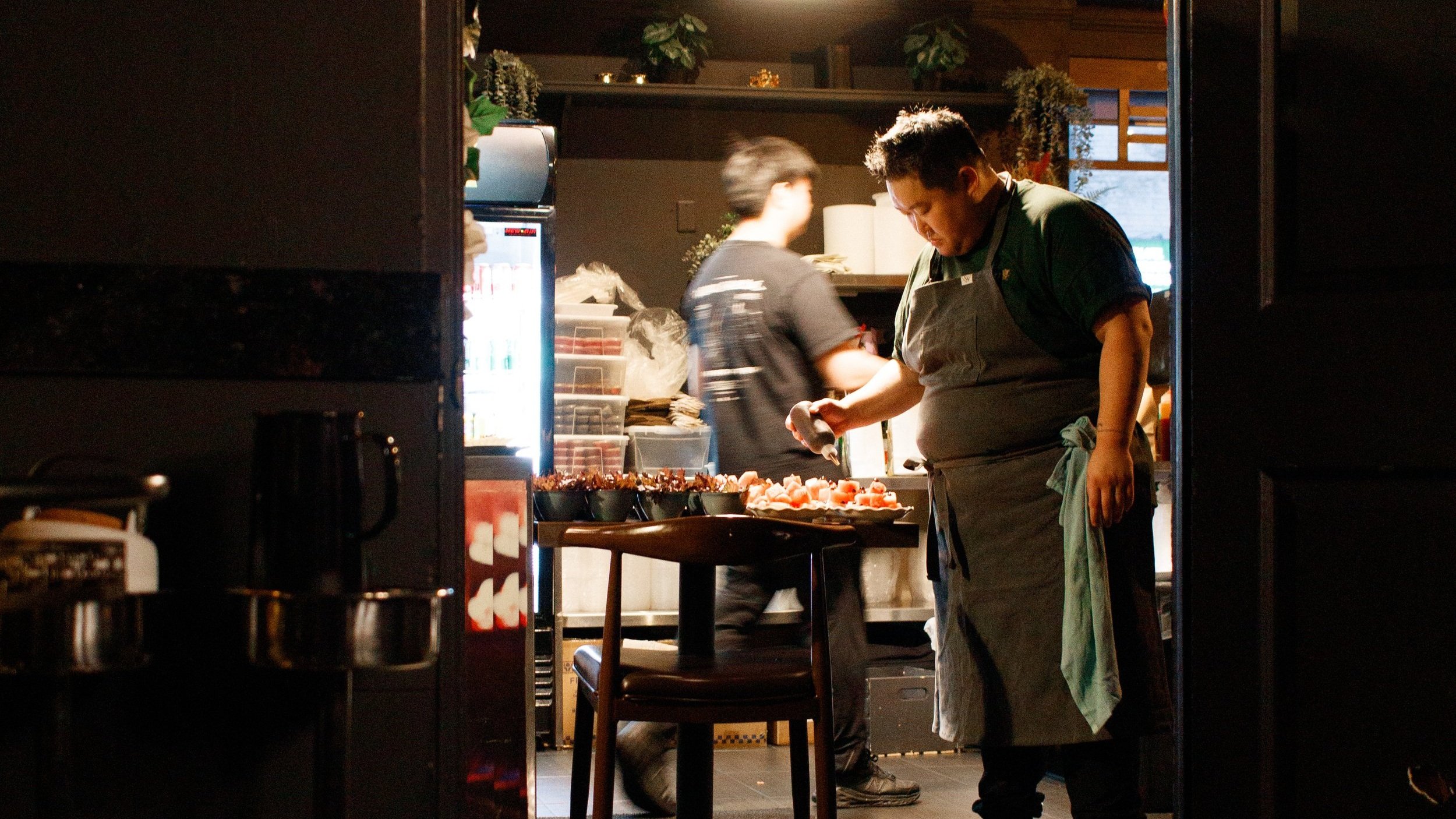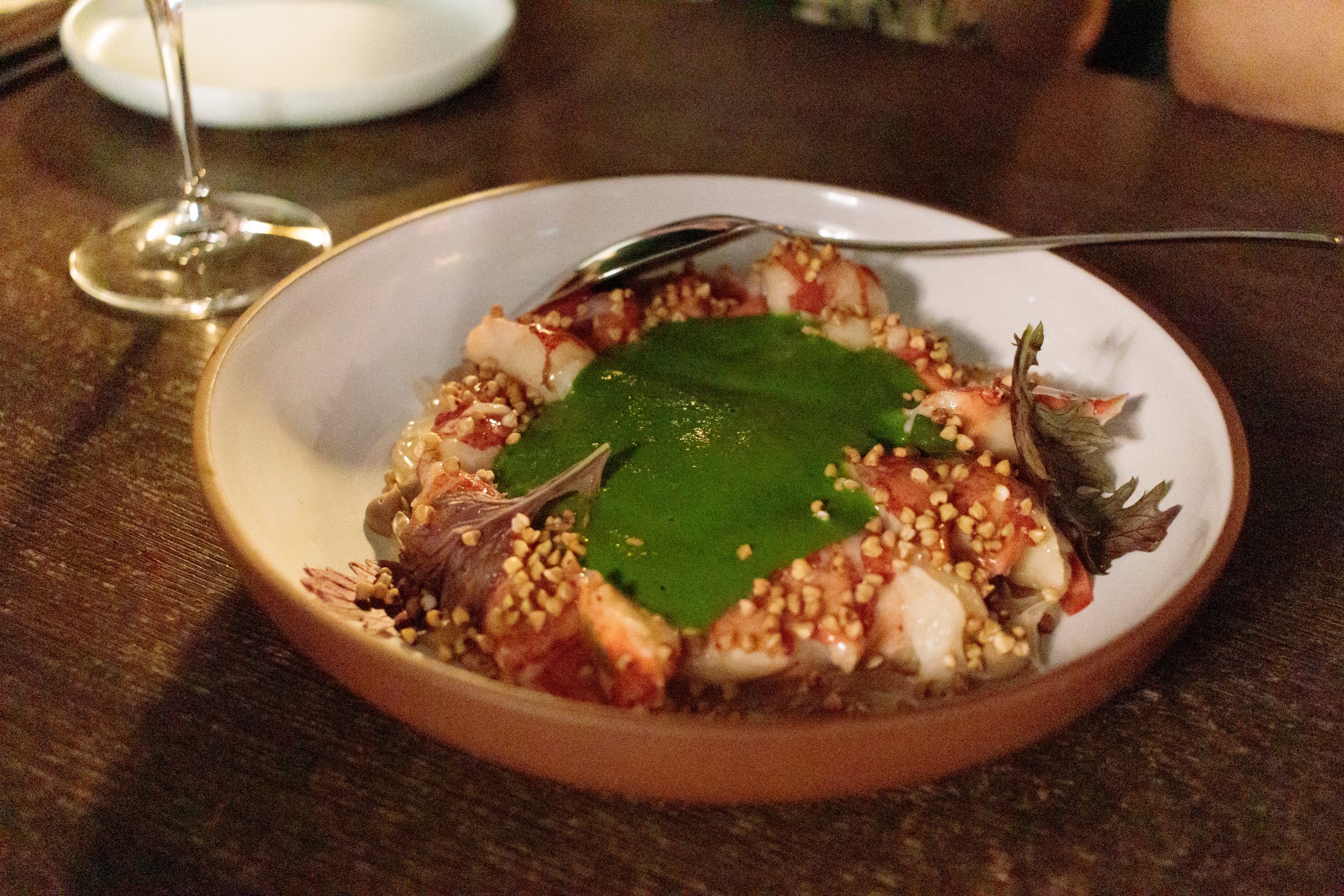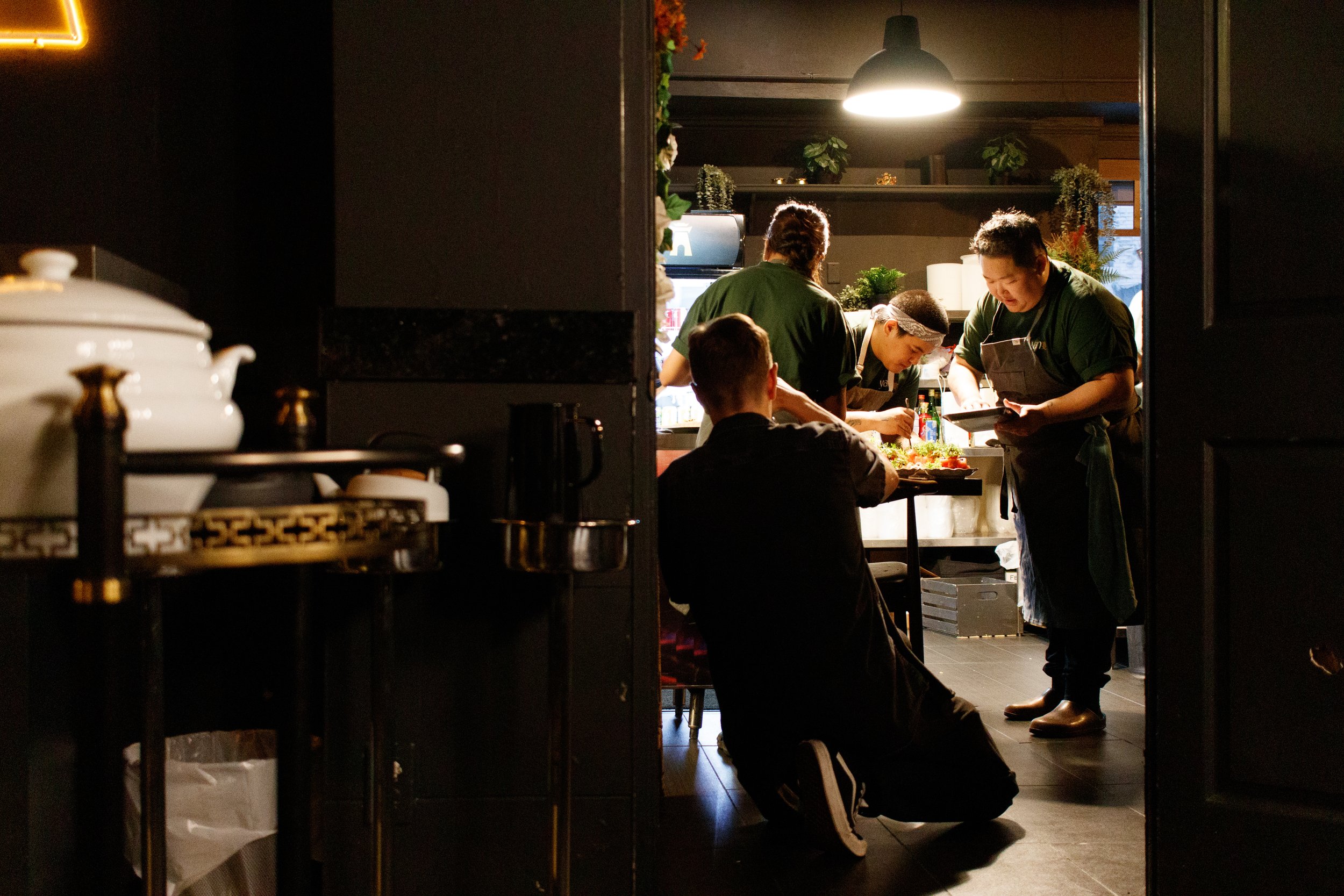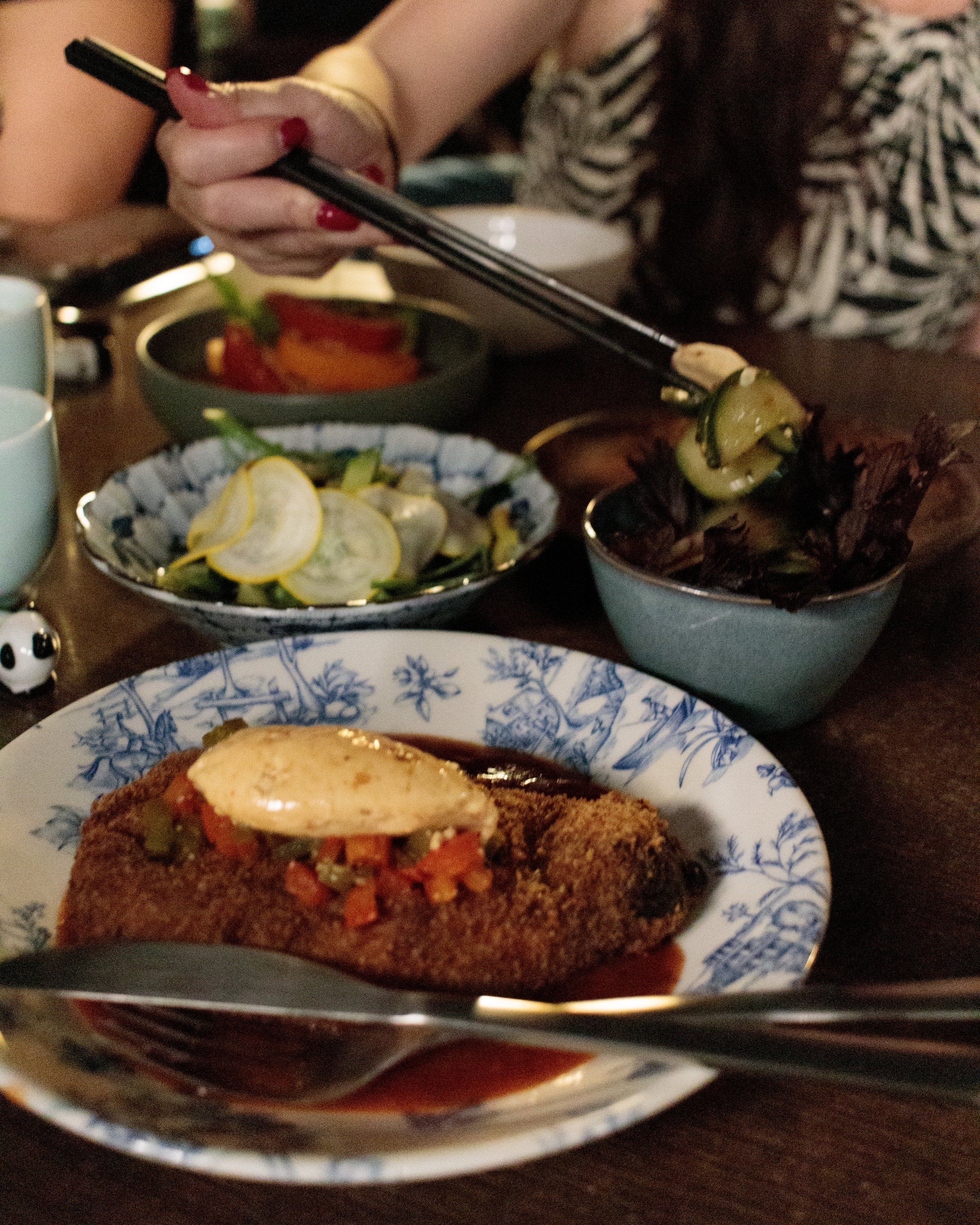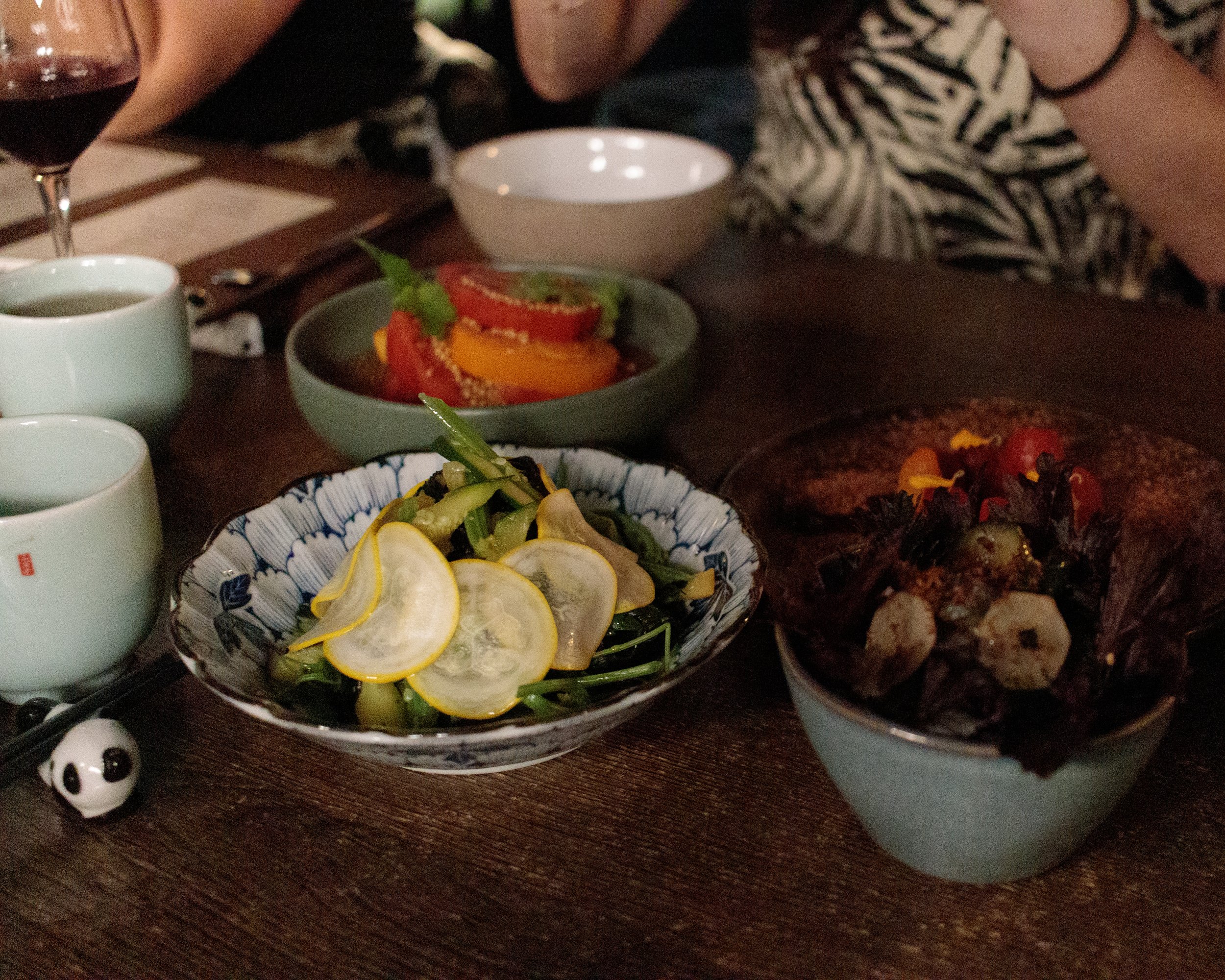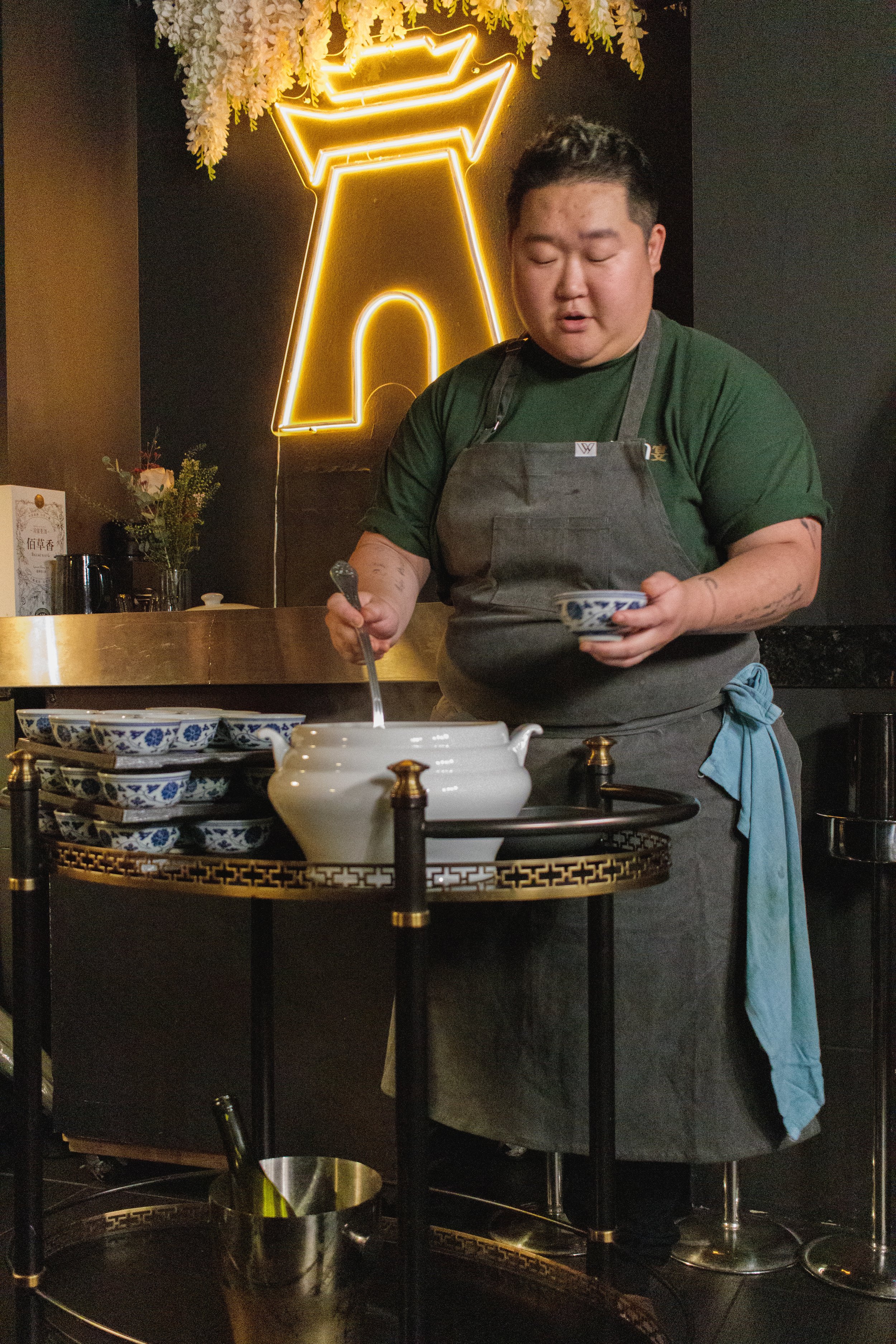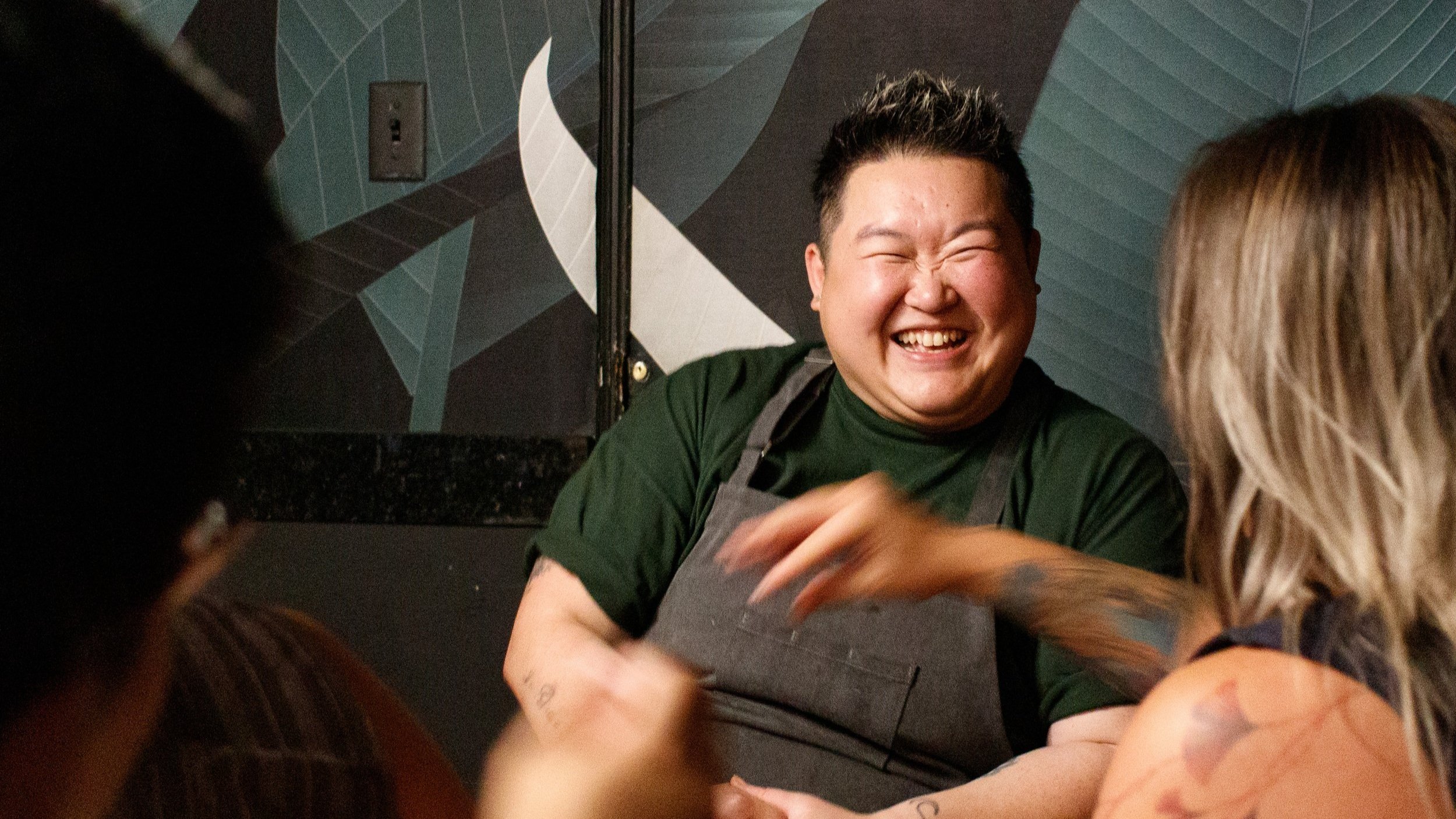CHEF EVA CHIN: THE GODDESS OF NEO-CHINESE COOKERY
How Eva Chin is Changing the Face of Chinese Food in Canada
Words by Kimberley Kwo, Photography by Nick Wong
Through the doorway connecting dining room and kitchen is a perfect view of the delicate dance being performed by Chef Eva Chin and the team at Colin Li’s Hong Shing. Despite being comfortably seated, I’m filled with nervousness and excitement. It’s the calm before the storm: the soft open. In a room full of Eva’s friends, we are witnessing the birth of her baby, Yan Dining.
I’ve been waiting for this moment for almost two years, when we met at the inaugural CCYAA FreshFest Food Festival in 2023. I was part of the organizing team and she was featuring her popup concept, Soy Luck Club. We bonded over our mutual love for The Keg, a restaurant chain she has contentiously claimed as “the greatest restaurant in Canadian history.” It’s an opinion she’s had to publicly defend. After this first encounter, we’d see each other at community events and I’d tag her on my Instagram Stories every time I shared a visit to The Keg or found their products on grocery store shelves.
In the coming months, we followed her collaboration dinners and the more I tried her dishes, the more enthralled I became. I was fixated on the idea that Eva needed her own restaurant. Eva’s style of cooking is what she calls Neo-Chinese; a modern interpretation of traditional Chinese culinary techniques using fresh, local, and seasonal ingredients. I’ve experienced many attempts at this, but nothing even comes close. Eva is in a league of her own and she is changing the face of Chinese food in Canada.
It’s not just her playful interpretations or injections of cross-cultural traditions (what she calls “confusion fusion”). There’s something about experiencing her beautifully crafted meals that's equal parts joyful and academic. Like a sleight of hand trick, what would normally be the prototypical talk track that accompanies a course becomes a passionate lesson on the history of Chinese civilizations; a deep dive into regional differences and specialties, anthropology, agriculture, politics, peppered with her own lived experiences. And before you know it, you somehow feel smarter eating her food. More connected. More educated. More respectful. And what already tasted extraordinary now somehow tastes … more.
What Chef Eva is doing with Neo-Chinese food is significant for people like me: a 1.5-generation immigrant who has always struggled with identity. Not Chinese enough, and yet not Canadian enough either. Coming from Mauritius, there have been times where I’ve wondered if I was even Chinese at all save for my genetics. I’ve come to meet many people like me - immigrants or children of immigrants, with one foot in one culture and one foot in another. Eva’s dishes and her storytelling create a bridge for me between the familiar echoes of my grandmother’s cooking; the deep, unspoken layers of my cultural DNA; and the realization that who I am today is equally part of this story.
The richness of Eva’s culinary commentary on identity is a reflection of the nuances of her own. Eva is many things. She was born and raised on her grandmother’s farm in Kahuku, Hawaii, to a Chinese-Singaporean father and a Hawaiian-Samoan-Chinese mother. She is what she calls a “triple label whammer” - she is female, she is Asian, and she is gay.
Eva explains that the very things that make her and her perspective unique have also left her vulnerable to exploitation by past would-be investors with less-than-sincere motivations. “I am two more labels short of having a very hard life for myself. When I think about the situation I put myself in, and I think about the things that I want for my future, for my vision, [these] are very easy if I were someone who was hetero-normal, cisgendered, conforming to myself, my traditions and my culture, and the people before me. It would have been so easy. But I specifically chose not to take that route. And so I knew from day one that what I wanted had to come from someone to truly align with my worth, my value, and who I am, instead of exploiting me, or taking or choosing what they want from me and then rejecting the rest. It was because of that, at a very young age, I knew that what I wanted was going to be exponentially harder than Mary next to me who wants the same thing.”
Eva claims she’s not an advocate. Yet by virtue of who she is and what she is accomplishing with her craft, this is where we disagree. We still live in a world where being a queer female BIPOC chef is, statistically, highly improbable. Eva may not have set out to be a voice for a generation of marginalized queer immigrants, but with representation comes a responsibility that is bestowed upon the often unsuspecting few who achieve such a platform. There’s a weight to representation that not everyone can bear; but whether Eva recognizes it or not, it’s one that she is carrying with an unwavering heart and a hell of a lot of ambition.
“I never thought in my career, I would be someone to speak up about Chinese food. Because I always thought, ‘oh, there's enough people speaking about Chinese food.’ It took me a long time to realize there actually isn't.”
It was 2020 when Eva came to this realization, after moving to Toronto from Vancouver to take over Momofuku Kojin as Executive Chef. Having mostly worked for male European chefs up to that moment, it was the first time that Eva worked for an Asian-owned company in North America. “It was very bizarre,” she says. “I was cooking with soy sauce, with fish sauce, with kimchi, with gochuchang. My founder was a big Asian Korean man, all these things I never had before in my career. So it was very different to work at Momofuku, where my CEO, CFO, COO were white female, but my owner was a Korean male chef, and I was surrounded by Caucasian cooks who are passionate about Japanese, Korean, and Chinese food. Every day, staff meal was Asian food. My mind was blown. And when I was put in that liberty of my culture, of my ingredients, and my cuisine all the time, that's when I really got put in that spotlight.”
A spotlight that never would’ve shone as brightly without the media attention drawn by a collaboration between Kojin and Alma: a flawlessly executed Lunar New Year meal kit created during unprecedented lockdown conditions. A project that got little-to-no support from the multi-million-dollar David Chang empire, ultimately leading to Eva’s disillusionment on representation.
Restaurants were among the most impacted businesses over COVID, trying everything to stay afloat. Sales plummeted, many lost their jobs, and the pressure to survive mounted by the day. Eva was new to the company yet had to figure out how to save it. It was December and everyone, including Momofuku, was putting out an at-home Christmas dinner meal kit. She recalls that December always marked the time of the year she would purchase her flight home to China to celebrate Lunar New Year with her family. The reality of not being able to go home hit her hard and she began wondering how she would have access to the quintessential Chinese New Year feast under lockdown.
“So then I was like, ‘what if we launched a Lunar New Year meal kit for all the other lost Asians like me in the city right now?’ And so I thought to myself, I'm gonna loop in another restaurant that needs help, that can benefit from collaborating with a big name. And I thought of Anna Chen, because Alma was one of the first restaurants I went to eat in Toronto. I love her food. And you could tell that she literally just took her entire savings to open this place. So I thought to myself, I really want to help the chef survive through this, because I can't imagine what it's like to open a restaurant and be locked down.”
The reaction from Momofuku headquarters was surprisingly and disappointingly lukewarm. Eva detailed the elaborate and highly bureaucratic 2-month process of approving any special menu: the 8-page submission document, multiple emails to multiple departments, PR approval, and multiple meetings. She followed all the steps, dotting her i’s and crossing her t’s, but recalls that every department head was unsupportive and non-committal. Saying “no” was not an option since it could raise a human rights complaint, so they did the “next best thing” and remained unhelpful when asked for advice or support, expecting Eva to fail.
“No one believed in it at Momofuku,” she says. “No one did. Except for my own kitchen team, but there's nothing they can do other than execute my recipes. But I had my whole team and Kojin behind me and that was Steve Allery at that time, my Sous Chef Steve, my current Sous Chef Cy (Cyril Maquinto), who was my cook then, my then manager, Rebecca, but other than my own kitchen and service team, no one, even my Director of Operations was willing to touch that hot stone of a project.”
Eva responded in kind and did the next best thing to her: using her own network, she stepped out of her comfort zone and played every role, “bulldozing” her way through as she calls it. In her previous seven years spent in Vancouver, Eva had built a network of food critics and writers. She reached out to Globe and Mail’s Alexandra Gill asking to connect with her Toronto counterparts. She pitched her story and asked for help from reporters that, being new to the city, she’d never met. It worked. The Toronto Star published an interview. Then the CBC. Then others followed suit.
While chef collaborations may be commonplace today, in the face of peak lockdown constraints Chefs Eva Chin and Anna Chen accomplished something remarkable. They created an 8-course menu through recipes formatted via Zoom. Meeting only once, standing ten feet apart and masked, they taught each other how to cook their respective dishes. And, in a two-week timeframe, they sold 500 meal kits through both Kojin and Alma, earning enough for both companies to keep every cook on full-time hours for a month. Only then did Momofuku’s New York headquarters choose to celebrate the milestone on social media.
“That was one of the biggest lessons taught to me that day: if you want it, go get it. There’s no better example than that in my life that was ever shown to me. If you want something, and you can execute it, go get it.”
Of all the identities Eva could’ve channeled and all the cuisines she knew intimately, she chose to champion Chinese cooking. I asked her why, and of all the answers she could’ve given me, nothing prepared me for this:
“I made a conscious choice to really dig deep and focus on Chinese, because my parents stopped talking to me the day I married my wife. And I realized that I came to learn that I felt closer to my parents more than ever, without having to talk to them, by learning Chinese food, by remembering them through the foods that we cooked and ate with each other, I remembered them more. And I learned about their struggles and their journey as an immigrant more by diving into the issues that caused Asian racism and hate. And so, what started off as my way of trying to hold on and hang dear to whatever was left of my parents turned into the passion that I developed for my culture. And that's why I chose Chinese because I thought, in the beginning, I was like, maybe I can win my parents back by just being a really, really good Chinese daughter. At first it was from that, but then it started to slowly become just, wow, I'm really in love with this part of my family. I really, really got to know my parents more. I understand my parents, I forgive them for being so closed-minded, because I know what they're thinking and I know what's going on in their minds. And I don't agree with it. But now I understand. And so more than ever, I am now proud to be Chinese. And I think sometimes, for a lot of people who are mixed race, it's very hard to choose one. It's very hard to be loyal to one. And it's, to me, it has nothing to do with how much percent of that is in me. What part of my skin looks more than the other. It really goes with what is close and dear, and tugging to my heart. And I find that the majority of the stories of who I am as a person came from my Chinese and Hawaiian side.”
I’ve often wondered what drew me so much to Eva’s cooking: perhaps it’s the breadth of her knowledge, the deliberate details in her dishes, the risks that she takes, while not taking herself too seriously. The fact that she plays with her food, or even something as biased as how quickly we became friends. But now, as I piece it all together, I understand that it’s the vulnerability and openness with which she pours every part of herself into feeding us. An act so powerful and moving that I struggle to put it all into words. And if that is not already enough, she’s done it all without ever setting foot into culinary school.
What Eva did study was behavioural science. Poised for a career in Quantico and field research, she had trouble seeing herself in the future her family had carved out for her. That uncertainty pushed her to take time off to travel, where she found a different education. “I went to the school of hard knocks,” she says with a chuckle. After trying the familiar model of teaching English in Asia, she quickly found it wasn’t for her. Cooking was a more natural way for her to fund her travels, starting in Japan, then Australia, and then on to Europe. Each destination exposed her to new techniques and philosophies, allowing her to rise to the next level. Every chef recognizing her drive and potential recommended her to the next one. It wasn’t until she landed in Shane Osborn’s kitchen in both places — years into her odyssey — that she finally came to the realization that cooking was her calling.
Passion alone cannot achieve the mastery required to wield ingredients, to convey the level of depth that Eva is capable of expressing with her food. She’d amassed the skills, but the last piece of the puzzle was something she’d been cultivating her entire life. Growing up on a farm in a place as bountiful as Hawaii, Eva had developed a deep understanding of food at its most natural state and how it speaks to the people who come from that land.
“I think that will forever set me apart as a chef: that I always think as a child of the land. I was born and raised ripping fruit out from the ground myself. I never for as long as I can remember, I don't perceive food as coming from a container.”
When Eva finally made it to Canada, her first two years weren’t spent cooking, but farming. Eva came to Canada by way of the World Wide Opportunities on Organic Farms (WWOOF), a non-profit organization that promotes sustainable and regenerative farming. WWOOF connects people with organic farms that offer opportunities to learn about sustainable practices while engaging in cultural exchanges. In exchange for farm work, participants receive room and board from farmers, who host individuals from all over the world.
Eva chose three farms that she believed would teach her most about BC; an organic and biodynamic fruit farm in Agassiz, a produce farm in Similkameen Valley, and a horse ranch in Cawston. She eventually went back to cooking and established herself in Vancouver, first as Executive Chef at Royal Dinette, then as Chef de Cuisine at Boulevard Kitchen and Oyster Bar.
When Eva came to Ontario to helm Kojin, between the never-ending fits and starts of quarantine, she immersed herself in learning about the land the way she did in BC. I imagined the places she’s been, Hawaii and Vancouver in particular, with far more forgiving climates and the lush bounty of those lands, and foolishly asked her why choose Ontario if local agriculture was such an important part of her cooking. I was treated to an impassioned soliloquy:
“If you ever drive across the country, from the west to the east, you’ll notice that just as you're entering Ontario, like where Sault Ste. Marie is, there's a sense of heaviness that engulfs you, from left to right, as you enter the granite. It's a type of rock that surrounds most of Ontario. Ontario is not a barren land. It's actually very lush. The rock formation is hard. There's something hearty about Ontario and it just reminds me of unloved land, and misunderstood land. That's why through Quell, I do a lot of work with the Dairy Farmers of Ontario, chicken and pork farmers, for a reason; I work with these clients because I want to know exactly what Ontario produces and what they're good at. And Ontario is amazing for livestock. It may not grow the same amount of peaches and cherries that Vancouver does, but it provides for all these living animals that we consume. We are the number one pork exporter, chicken exporter, and beef [exporter] of all of Canada. These are the three animals that require the most land. And at the same time, these animals’ feces are what nurtures this land into a very very lush growing piece of land that people are not thinking about. It may not have the best weather, but I think Ontario has some of the best lands this country has to offer. It's just misunderstood because of the weather, because of the hardness, and because of the disconnection that people have with indigenous folks in this province.”
“I think as chefs, we need to understand that connection. And it's beyond just making a call to a farmer to deliver food to your doorstep. People think farm to table is the be all and end all. No, that was the first step. That was opening the door. I ask more from my cooks than just thinking of using farm vegetables. Do you go above and beyond? Do you go to the land to learn? Do you talk to the original people of this land?”
It takes a village. And as I shift my focus from the kitchen to my dinner companions, I can see that the connection that Eva speaks of goes beyond the land. There are farmers that Eva works with - among them James of Greenock Food Collective who provided the beef for tonight’s meal. There, chefs that Eva’s already planned collaboration dinners with. There, members of a monthly exploratory eating club that Eva formed, many of whom started as strangers and quickly became true friends. And, there: long-standing friendships going back to her Vancouver days, who have no ties to the industry but inspire her nonetheless. “I want everyone in our community to be part of our journey,” she once said to me. But I’m not sure how much she intended to be the one building it.
“What I want is to one day bridge the gap between our estranged generations through food. Like my own estranged parents.”
The lively banter shifts to silent anticipation as Chef Eva wheels in a dining cart featuring a large soup tureen and bowls. Never one for formalities, she engages the room with light-hearted, cheerful conversation as her wife Tree (Theresa, who took care of us that night), server Ella, and Colin file into the room and take their places by her side.
“Yan means banquet, or feast, in Chinese,” she begins. “It is my home away from home. As I speak, for a majority of immigrant kids, that's how we feel. There is no real sense of home. We bring home where our heart is. Chinese food is misrepresented in so many ways. I can't even begin to list, but I will try to walk through the menu and my sentiments as we go.”
Eva goes on to recount the history of the broth she is serving - taking us to British colonized Hong Kong, how melon made its way into the dried seafood soup, the disappearance of the recipe in the 80s, and how she came to revive it using Ontario-grown melon.
Seven more courses follow in similar fashion: Scallop, Cold Snacks, Lobster, Preserved Cherry, Mien, Beef & Herbs, Sweet. Each course accompanied by stories and a diversity of perspective that breathe life into the dishes, making them richer, enhancing their flavours like a jolt of mental umami.
Eva has endless stories to feed her imagination and her ever evolving menus, but she’s more interested in what she has yet to learn. “I don't want my restaurant to be based off of two years of backpacking as the only storytelling timeline I have,” she said. “Chinese cuisine needs to move forward. How many memory dishes can we cook? There also has to be forward, an untouched zone of Chinese food that we're willing to touch. That's not based on nostalgia, or memory, or some dish we had when we were eight years old. Where it is an unknown territory. And that's the only way Chinese [food] can move forward.”
Yan Dining is only the beginning. Eva has big dreams to break beyond Yan’s humble walls within Hong Shing to stand on its own two feet as an institution in and of itself. In time, she’ll do just that, with Colin and the might of the community she continues to build standing with her. She’ll venture into the unknown and continue to shape Chinese food in ways others have fallen short, with deep understanding and reverence to the past and the present. In time Eva will make her mark and earn her Stars. But tonight, we feast. To all of us in that room, she has already won.
Words by Kimberley Kwo, Photos by Nick Wong
